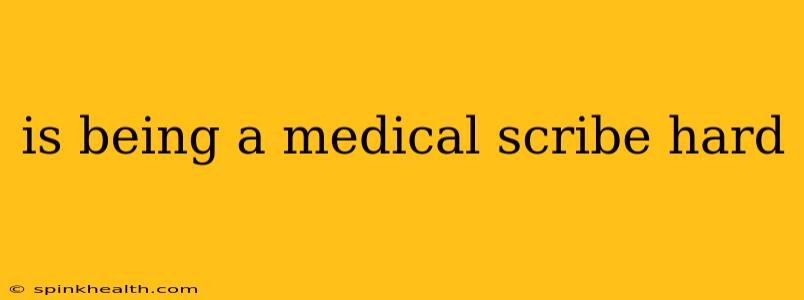Is Being a Medical Scribe Hard? A Day in the Life and What to Expect
The flickering fluorescent lights hummed a quiet tune, a counterpoint to the rhythmic tap-tap-tap of my keyboard. It was 7 PM, and the day—my first day as a medical scribe—was finally winding down. My fingers ached, my brain felt fried, but a strange sense of accomplishment settled over me. Is being a medical scribe hard? The answer, like many things in medicine, is complex.
It's not simply a question of typing speed or medical knowledge (though those certainly help!). Being a medical scribe is a demanding job that blends intense focus, quick learning, and exceptional multitasking abilities. Think of it as a high-stakes game of information triage, where every detail matters.
What are the daily tasks of a medical scribe?
My day started at 8 AM sharp. My first task? Shadowing Dr. Ramirez, a seasoned internist whose pace was… brisk. He moved between patients with the efficiency of a seasoned surgeon, dictating notes, ordering tests, and answering questions with equal parts speed and compassion. My role was to capture everything. Every symptom, every medication, every diagnostic finding – all had to be meticulously documented in the patient's electronic health record (EHR).
What skills do you need to be a good medical scribe?
This brought me to the heart of the matter: the skills. You absolutely need:
- Lightning-fast typing skills: I'm talking 70+ words per minute, with accuracy. You're not just transcribing; you're actively keeping up with a doctor's rapid-fire assessments.
- Medical terminology proficiency: While you don't need a medical degree, a solid grasp of medical terms is crucial. Knowing the difference between a myocardial infarction and a myocarditis is far from optional.
- Excellent listening and comprehension skills: You'll need to quickly process information from both the doctor and the patient. Missing a crucial detail can have real-world consequences.
- Multitasking abilities: Juggling multiple patient notes, managing interruptions, and staying organized are key to success.
- Attention to detail: Accuracy is paramount. Incorrectly documented information can lead to misdiagnosis and potentially harm patients.
Is the workload manageable?
The workload can be intense. There are days when you're on your feet for hours, following the physician from room to room. The pressure of keeping up with a busy doctor can feel overwhelming, especially in the beginning. But, as I learned, with practice, you develop a rhythm, a shorthand, a way to process information quickly and efficiently.
What are the challenges of being a medical scribe?
The challenges aren't just about the workload; they also include:
- Emotional toll: Witnessing illness and injury can be emotionally draining. You're privy to intimate patient details and sometimes difficult situations.
- Long hours: Many scribe positions require long shifts, often including evenings and weekends.
- High stress: The fast-paced nature of the job can be stressful, particularly when dealing with multiple physicians and competing demands.
How can I improve my chances of success as a medical scribe?
Here's the good news: while challenging, it's also incredibly rewarding. To improve your chances of success:
- Practice your typing skills: There are numerous online resources available. Consistent practice is key.
- Learn medical terminology: Online courses and medical dictionaries are your friends.
- Develop strong note-taking skills: Practice summarizing information concisely and accurately.
- Develop strong listening skills: Focus on active listening and note-taking techniques.
Ultimately, the "hardness" of being a medical scribe is subjective. It's a challenging but potentially highly rewarding career path for those with the right skills, dedication, and resilience. My first day was tough, but the sense of purpose—knowing I'm playing a vital role in patient care—makes it all worthwhile.

